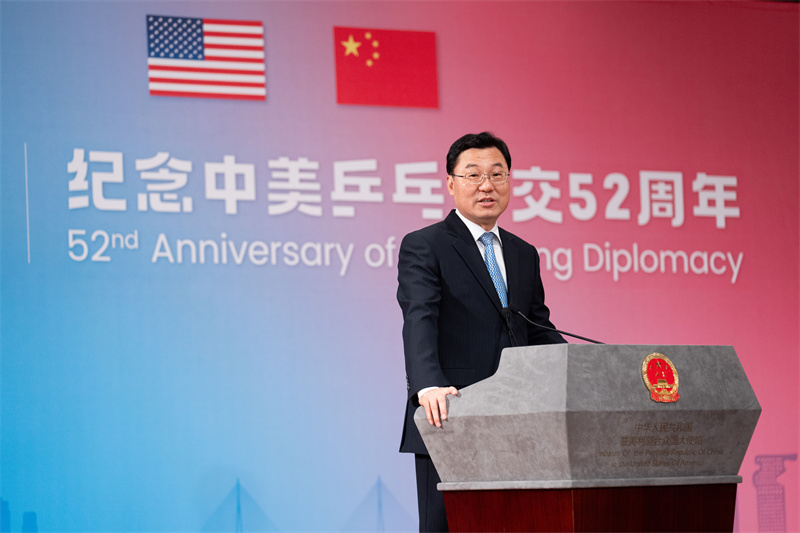
On the evening of December 13, 2023, the Chinese Embassy in the United States held an event to commemorate the 52nd anniversary of ping-pong diplomacy. Ambassador Xie Feng attended the event and delivered remarks. Vice President of Peking University Fang Fang, Director of International Strategies and Development of U.S. Olympic & Paralympic Committee Dragomir Cioroslan, Vice President of National Committee on United States-China Relations Jan Berris, Chair of the Board of Directors of USA Table Tennis Richard Char and more than 300 guests from various sectors in the United States also attended the event.
Ambassador Xie first welcomed the delegation of the Peking University table tennis team to visit D.C. and have a friendly game. He paid tribute to the participants of ping-pong diplomacy including Connie and Dell Sweeris, Jan Berris and Douglas Spelmang, and expressed his heartfelt thanks to all friends who have long cared for and supported the development of China-U.S. relations.
Ambassador Xie said that over half a century on, we can still draw much inspiration and wisdom from ping-pong diplomacy.
First, keep abreast of the times, and follow strategic guidance. In the shadow of the Cold War 52 years ago, the leaders of China and the United States demonstrated extraordinary strategic vision, political courage and diplomatic wisdom, reopened the doors between China and the United States with a small ball, and set off the normalization of bilateral relations. Their decision significantly changed the international landscape and reshaped the course of world history.
At their historic summit in San Francisco last month, President Xi Jinping and President Joe Biden discussed the right way for China and the United States to get along with each other in the new era, and fostered a future-oriented San Francisco vision. President Xi pointed out five things China and the United States need to jointly work at, which have laid out five pillars for stabilizing and developing China-U.S. relations. The summit has consolidated the momentum toward stabilizing China-U.S. relations, and injected much-needed certainty and stability into this turbulent and fluid world. It has been widely welcomed by both countries and the international community.
Second, boost people-to-people exchanges, and pool public support for China-U.S. relations. Both China and the United States are great countries. Both our peoples are kind, hardworking and down-to-earth, who are friendly toward and interested in each other. At the welcome dinner hosted by friendly American organizations in San Francisco last month, President Xi recalled fondly his friendship with the American people. He emphasized that the foundation of the China-U.S. relationship was laid by our peoples, its doors was opened by the peoples, its stories were written by the peoples, and its future will be created by the peoples. His words struck a chord with peoples of both countries.
Third, respect each other, and demonstrate good sportsmanship. Starting with ping-pong diplomacy, sport has served as a bridge between our two peoples. Sport is both about striving for the better, and about respecting and learning from each other to make progress together. It is about abiding by rules and ensuring fair play. One cannot be both the judge and the athlete, tie the hands of their competitors, still less deny others an opportunity to be part of the game. One should focus on improving themselves instead of bringing others down, and play by the rule of the game instead of ganging up on the other side. Sport is also about embracing openness and inclusiveness, and rising above differences. There is no reason why competitors cannot also be friends.
Ambassador Xie stressed that the China-U.S. relationship today is again at a crossroads. The era is calling on us to draw wisdom and strength from ping-pong diplomacy, stabilize and improve the relationship and ensure its sound, stable and sustainable development, so as to reassure our peoples and the world. The two sides need to re-break the ice between our countries. It is hoped that the U.S. side will work together with China, develop a correct perception toward each other, start with concrete steps from now, act on the principles of mutual respect, peaceful coexistence and win-win cooperation, and prevail over the zero-sum narrative with success stories of mutually beneficial cooperation.
The two sides need to reinvigorate exchanges between our peoples. The Covid-19 virus hampered in-person communication, and trade and technology wars would only lead to conflict and confrontation. Only through engagement and dialogue can we avoid miscalculation, find a way out of the predicament and restore mutual trust. We need to encourage our peoples to visit and interact with each other more often and join hands together.
The two sides also need to embark on a new journey in the China-U.S. relationship. The summit in San Francisco is not a finish line, but a new starting point for bilateral relations. The pressing priority is to follow up on the meeting, enhance whole-process management, and in particular faithfully implement the common understandings reached between our Presidents, so as to stabilize and improve the bilateral relationship, turn the San Francisco vision into reality, and benefit both countries and the world. We expect the U.S. side to move with us in the same direction and follow up with more actions. Especially, it is important to prevent any flip-flopping, and avoid making one step forward but then taking half or even two steps backward, lest it should cause new obstacles to bilateral relations.
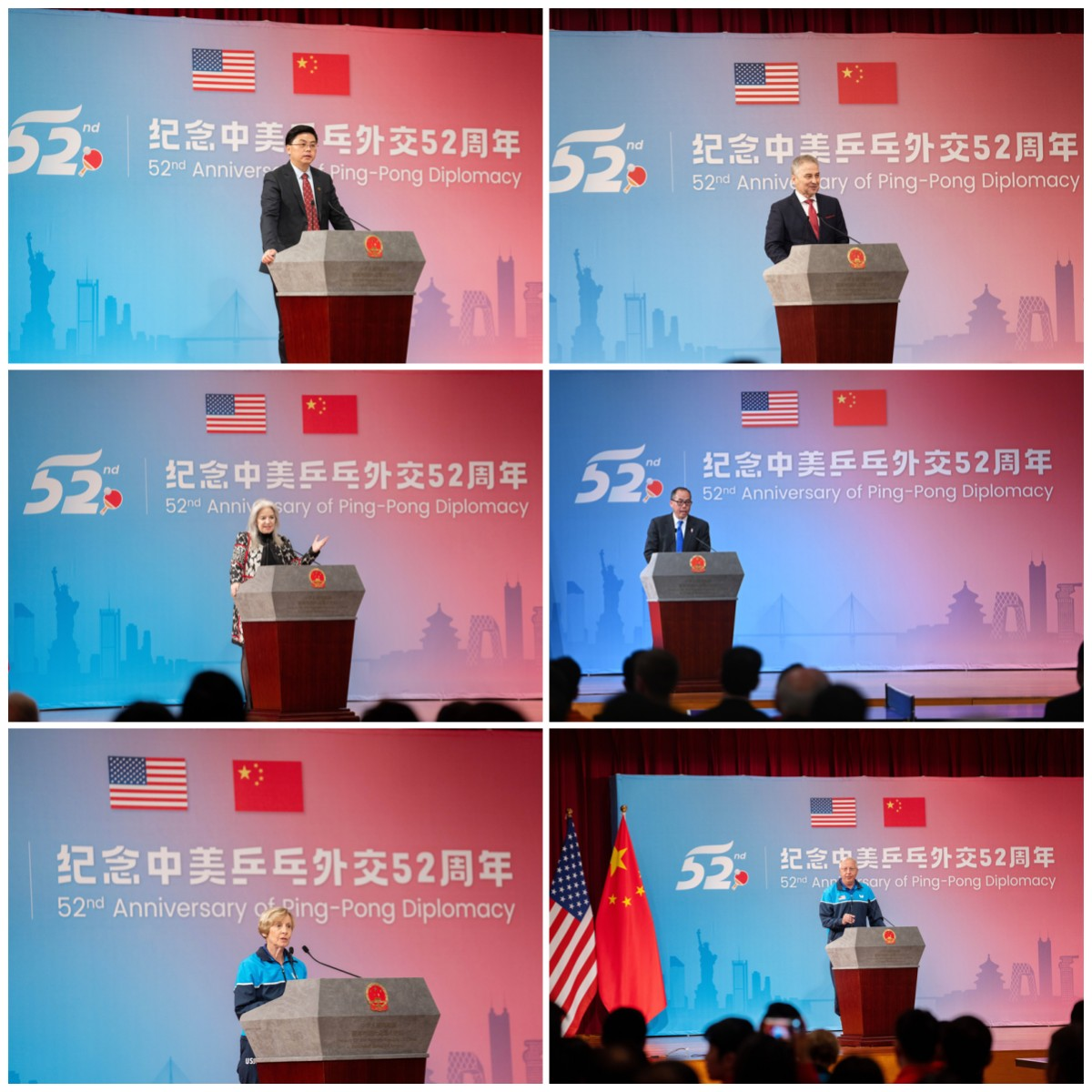
Mr. Dragomir Cioroslan, Director of International Strategies and Development of U.S. Olympic & Paralympic Committee, said that table tennis exemplifies the power of sports and is a common language for people around the world. It transcends national borders and barriers and embodies goodwill among people. He called for joint efforts to cultivate friendship, build mutual trust and contribute to world peace.
Ms. Jan Berris, who received the Chinese table tennis team in their return visit to the United States in 1972, said that the U.S. table tennis team’s visit to China in 1971 was not only a turning point in her life, but also a turning point in U.S.-China relations. The history of ping-pong diplomacy proves that although the United States and China have different cultural traditions and social systems, they can definitely respect each other and live in peace.
Mr. Richard Char, Chair of the Board of Directors of USA Table Tennis, said that table tennis is an important bridge between the peoples of the United States and China, and he thanked Connie and Dell Sweeris for their role in promoting the sport in the United States and boosting friendship between the two countries.
Connie and Dell Sweeris, members of the U.S. table tennis team who personally participated in ping-pong diplomacy, shared their stories. They said that they once saw Chinese athletes as unreachable legends, but after getting along with them, they became close friends. The peoples of the United States and China have every reason to be friends, not enemies. They expressed their hope that the younger generation will inherit the spirit of ping-pong diplomacy, strengthen communication and exchanges, and grow and progress together.
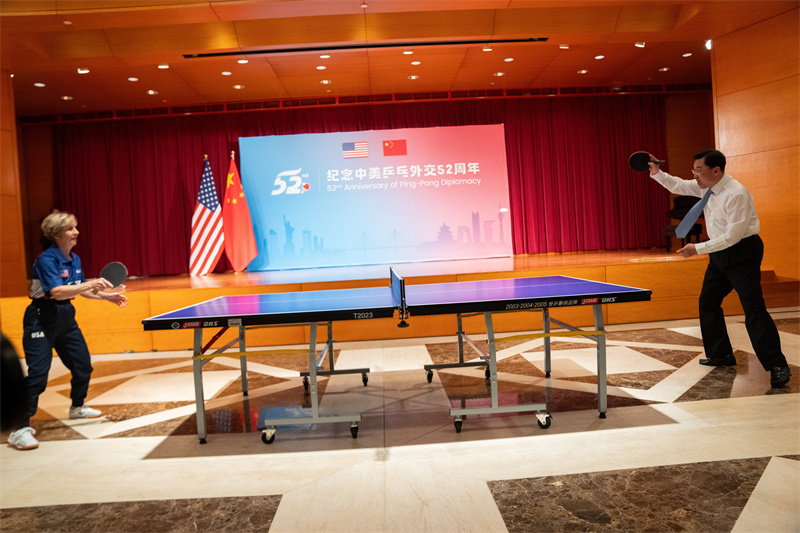
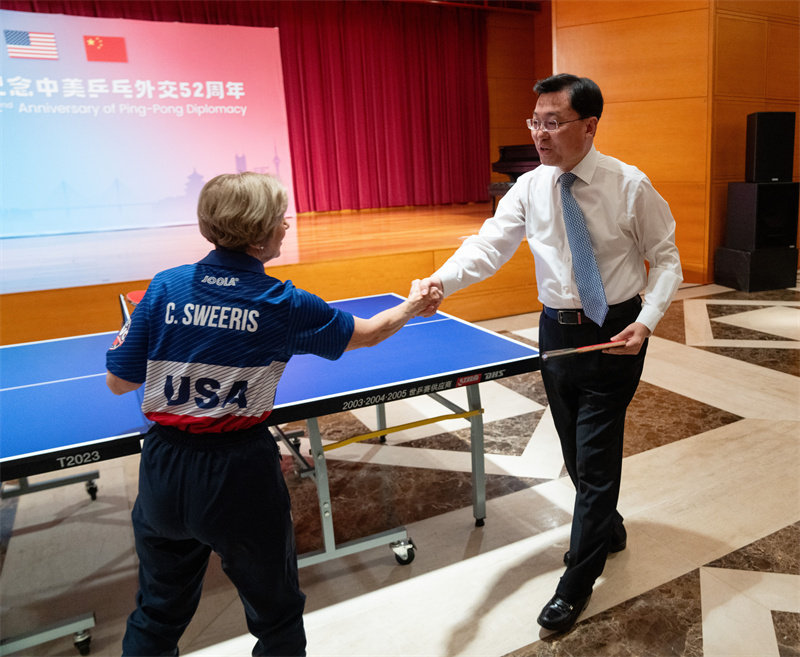
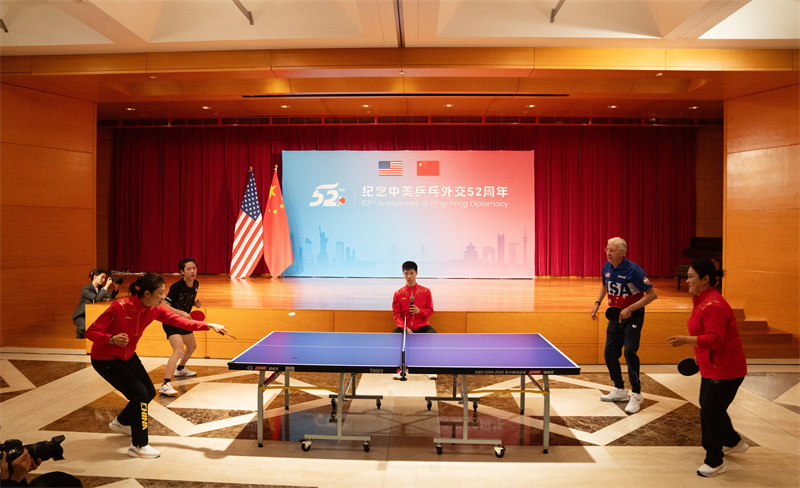
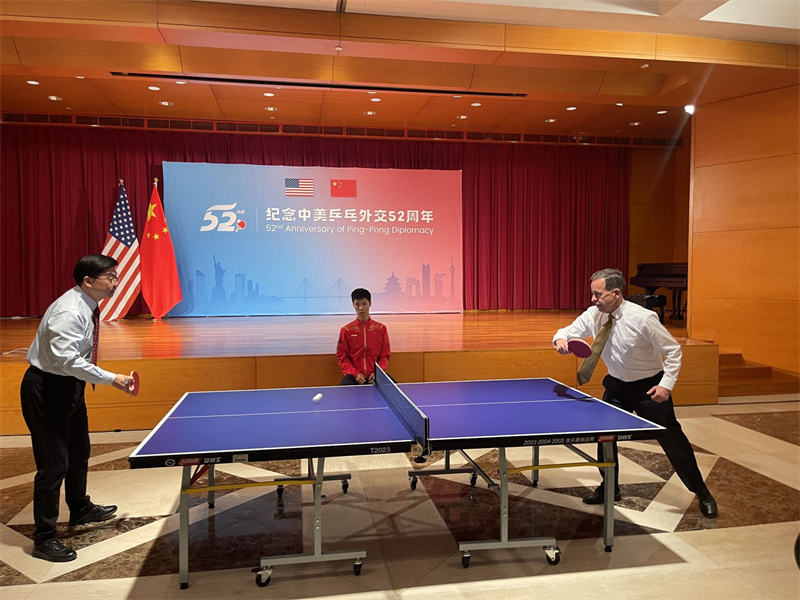
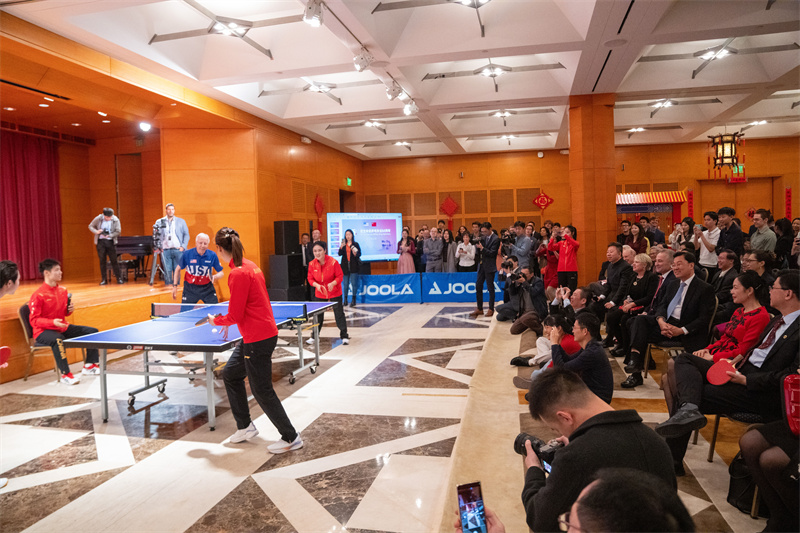
After the speech, athletes from China and the United States formed mixed teams to hold a friendly game. Ambassador Xie Feng and Connie Sweeris opened the friendly game with the ceremonial first serve. World champions Liu Wei and Ding Ning competed with U.S. table tennis fans, vividly interpreting the "friendship first, competition second" spirit of ping-pong diplomacy. The participants' wonderful performance received rounds of cheers and applause from the audience.

The Chinese Embassy also prepared a special cake to commemorate the 52nd anniversary of ping-pong diplomacy. Ambassador Xie and the guests together cut and shared the cake.
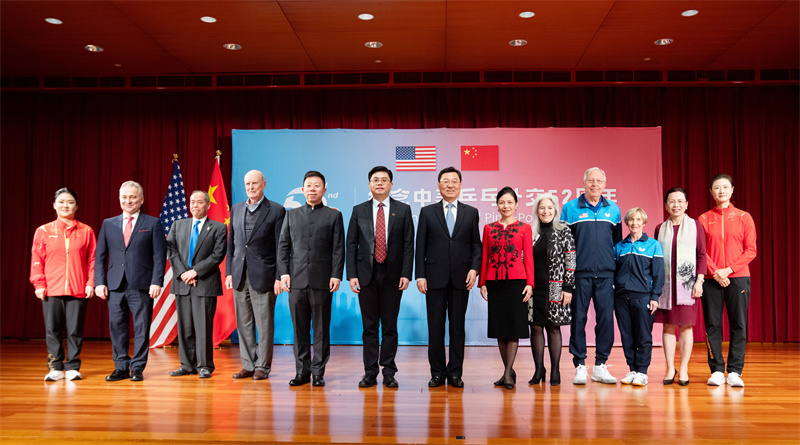
The guests spoke highly of the historical significance of ping-pong diplomacy, and expressed their readiness to contribute to enhancing mutual understanding and friendship between the two peoples and promoting the healthy and stable development of China-U.S. relations.